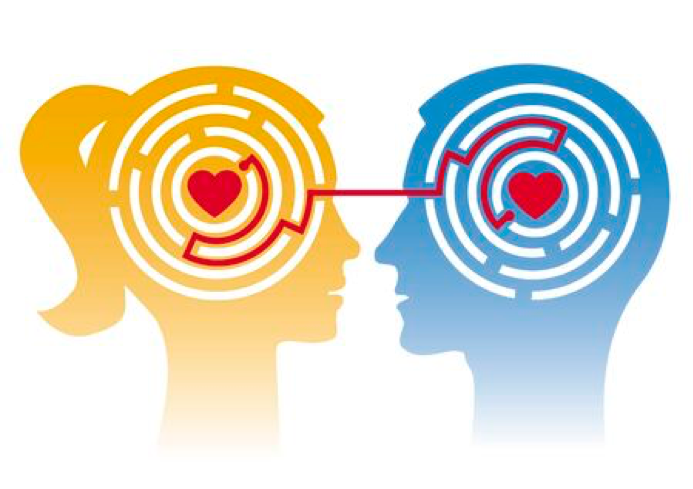
“Te quiero”, “T’estimo”, “Je t’aime”, “I love you”, “ich liebe dich”… all languages have their particular expression to show with words that universal feeling called love. However, they say that words can be carried away by the wind, or sometimes they can even lose their meaning from being used so much. Perhaps those sayings that popular knowledge harbours are true, but we should not forget that human beings not only communicate by speaking, also by their behaviour, whether consciously or unconsciously, voluntarily or involuntarily.
There are different ways to express what we feel. Sometimes it is easier to realize this with negative emotions. For example, if we are angry, we may tend to be physically aggressive (against furniture, for example), if we feel embarrassed, we tend to avoid exposing ourselves. All this without mentioning non-verbal language, such as facial expression, gesticulation, eye contact… of which we are not usually aware. Anyway, what interests us here is not what we do unconsciously, but what we imply with our voluntary behaviour.
Don’t you love me anymore?
How many times have you heard someone saying something like “I don’t feel loved” or “You don’t tell me you love me anymore”? We could agree that this kind of phrases will be said at some time by almost anyone in a relationship. What do they mean? Are they a sign that love is ending? It could be, but there is another explanation that may be closer to the reality of the problem. What hides a “you don’t love me anymore?” is: “you do not express the love that you supposedly feel for me”.

In any case, this message can be understood as an accusation, and it is not for less. We are telling our partner that something is wrong, or that he/she is not fulfilling us properly.
Unless our partner confirms that, indeed, we are right and he/she no longer feels the same way about us, what will probably happen is that he/she does not express love in the same way that we do. And here is the question: what forms exist to express love?
What are the languages of love?
According to Gary Chapman (1996), there are 5 languages that humans can use to express love.
- Words: in addition to “I love you”, with which this article began, the richness of spoken language allows us to show affection in countless ways and nuances. Not only do we have to stay with “I love you”, there are also compliments (how beautiful you are today, how well this shirt looks on you…), recognition (how well you have done, you are a great professional, how good is your cake…), encourage the other (I believe in you, I know you are capable for this…). At the same time, language allows us to make use of different intonations, as well as our own expressions, which make it possible to transmit even more affection (read that pastel tone with which we sometimes speak, or those affectionate nicknames that we use).
- Physical contact: Caresses, physical proximity, eye contact, massages, a hug, etc. would enter here. The closer these people get, the more intimate the relationship, until reaching sex, which would be the greatest expression of this language.
- Gifts: it seems superficial, but this will depend more on if you have bought anything, or if you have been thinking about what would really make that person happy. This is not about banal or expensive gifts, but about gifts with personal value.
- Quality time: looking for activities that are rewarding for both is the same as looking for quality time with him/her. With that, we are compiling pleasant experiences together, beautiful memories that are recorded in our memory. It doesn’t matter what activity it is. It can be lying down watching that series that we like, going on an excursion on Sundays or eating in that restaurant that we both like. It is not about the amount of that time, but about making it enjoyable for both.
- Services: Being willing to help and going out of your way to make life easier for your partner in a genuine way is undoubtedly a sign of affection. Good examples of this would be: I’ll leave you dinner ready, today I’ll do the shopping, go with your friends and I’ll do the laundry, I’ll pick up your ring, let me install the antivirus, etc. The problem would come if one of us always had the passive role in that exchange.

As you can see, there are different ways of expressing affection towards the other. Surely you already knew them, but you had not realized that they had that value. Precisely this is usually the problem, that sometimes we do not identify many of these behaviours as signs of love. This happens especially when we only understand one or two ways to prove it, hoping that the same ones will always happen. Creating these expectations does not allow us to notice many other signs that also mean the same thing.
In other words, we can commit the mistake of interpreting that he/she no longer loves us. Actually, we both do not express love in the same way, so we are not able to recognize the other one’s signs. That’s when we don’t feel loved.
How can we deal with this situation?
If we realize that we have this problem, we should share how each one feels, what signs of affection everyone need, and reach agreements so that both members of the couple are satisfied.
To do so, assertive communication will be very necessary. Rather than saying “you don’t love me anymore”, which have more of an accusing connotation, it is better to try the following.
To start with, try to notice what signs of affection your partner keeps giving you and thank them. Second, tell him how the absence of those samples you need makes you feel. And to finish, say something positive and ask what he/she would need.
“I really like that every Thursday you make my favourite dinner. I see you want to make me happy. But lately, I have noticed that you have stopped kissing me when you go to work or when we go to sleep. This makes me feel unloved, because I think I need that contact. I would ask you to try to do it again. I love you, and I want you to tell me if there is something that I do not do as you need.
If we look at it, unlike a phrase as forceful as “you don’t love me anymore”, this way of communicating reflects much more:
- It is conciliatory: because instead of attacking or recriminating the other, we carry out a reflection exercise that invites the other to reflect with us. In addition, it begins and ends with a positive aspect, which allows the other to see that we are not on the warpath, but with the intention of talking things out. We also end up asking him directly what he/she needs.
- Expresses a feeling and a need: the person identifies and expresses how he feels and asks for a change in the other member. This is extremely important, since the opposite would lead us to put up with situations that we do not like, ending up exploding. Each person has different needs in a relationship. To replace them, it will be necessary to communicate them and reach agreements so that both are satisfied.
- It is specific: it specifies what the person has done or failed to do, without falling into the trap of generalizing or defining the other. This makes it easier for the message to reach the receiver without misrepresenting it. Saying “you’re a bad partner” is not the same as saying “I need you to help me more with the children on weekends”.
- It focuses not only on the problem, but on the possible solution: the more specific it is, and if we focus onto other’s behaviour, the easier it is to ask for a change in that which affects us. Example: “I am in charge of helping our child with his homework every afternoon. I need us to take turns in the afternoons to help him.”

Finally, we must be careful not to fall into the extreme of “my well-being depends solely on what my partner does or says”. With this, we could justify any type of request, such as asking our partner to stop seeing their friends to be with us.
In the same way, the other extreme would not be good either, in which it is thought that “it does not matter what I say or do. If my partner is affected, it is his/her problem”. Our actions have consequences beyond our skin. If we do not take this into account, we could justify things such as insults or aggressive attitudes towards the other.
That is why it is important to learn to communicate assertively and express the needs of each one. In case we have difficulties in that, or one of the members is falling into one of these two extremes, it may be time to ask for professional help. A couple therapist can help us see what communication mistakes we make, and give us tools to improve the dynamics of our relationship.
References:
Chapman, G. (1996). Cinco Lenguajes del Amor. Spanish House Inc.
Guillem Nicolau Coll
Psicólogo General Sanitario
Nº col.: B-02773







